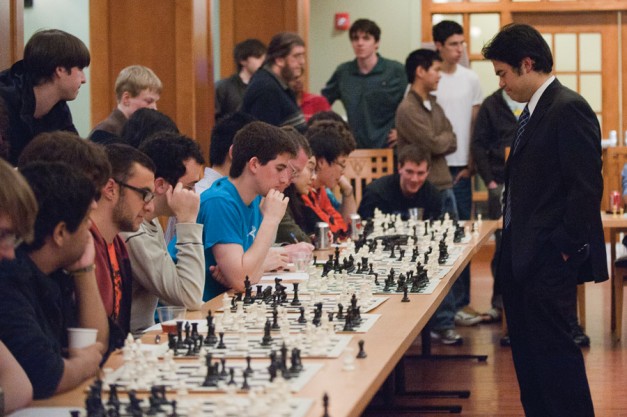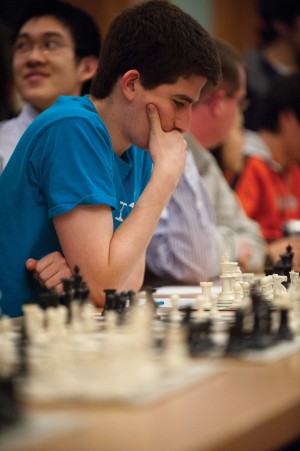Scene
Getting to know Grandmaster Hikaru Nakamura
Grandmaster Hikaru Nakamura stops to make his move against junior Mark Rosenberg during the 42-player simul challenge on Saturday. Nakamura defeated all 42 players in around two and a half hours. He also faced challengers in fast-paced bullet chess.
Related
Hikaru Nakamura, the No. 1 chess player in the U.S. and No. 10 player in the world according to the World Chess Federation rankings, came to College Hall on Saturday to share his love of chess with the Washington University community and take on 42 players concurrently under a simul format. He won all 42 games with ease.
Nakamura, 23, recently defeated the world’s top four players to win the 2011 Tata Steel Chess Tournament in Wijk aan Zee, Netherlands, in what has been called the greatest victory in the history of American chess by former world champion Gary Kasparov.
Nakamura also won United States Championship in 2005 and 2009. He became a chess master at age 10 and a grandmaster at 15 years and 79 days, at the time besting Bobby Fischer to be the youngest grandmaster in U.S. history.
Now a resident of St. Louis, Nakamura works with the Chess Club and Scholastic Center of St. Louis to promote and teach the game. He is also attempting to become the second American to win a World Championship (Fischer won in 1972). Student Life interviewed Nakamura before his appearance at College Hall, and Nakamura also fielded additional questions during the event.
Student Life: Why was a simul format chosen for this event? What will students get out of it?
Hikaru Nakamura: At my level, being so incredibly strong, you try to even out the odds a little bit. This isn’t to say that I’m not going to win every game because I think there is still relatively a high likelihood of that…It gives me less time to think when I’m making my moves on each board whereas my opponents have more time, so it’s a matter of trying to balance out the odds.
SL: When did you get into chess?
HN: I started when I was 7 years old. When I first started, I was reasonably decent. I wouldn’t say I was great because I wasn’t. In fact, the first tournament I played in, I lost all of my games….It was after that point [breaking Fischer’s record and becoming a grandmaster] where I realized that I had the potential to become something more than the average grandmaster in chess.
SL: You are known as a very aggressive player who hates to draw (tie) games. Is this true?
Junior Mark Rosenberg considers his next move against Grandmaster Hikaru Nakamura on Saturday. Chellengers had a long time to consider their next move while Nakamura played the additional 41 players in the simul format challenge.
SL: You were homeschooled and lived a very different life than the average child or teenager. How did chess change your childhood experience?
HN: One of the great things about traveling around the world [is that] you meet so many people from so many different backgrounds. In many of these tournaments, I’ve made friends with people from all over the world….Especially now, it’s great to go to one of these countries and look someone up…I think it broadens your view of the way the world is.
The drawback is that at the same time…you don’t have the same life when you’re not traveling and competing. It’s very much a mixed bag. Everyone you know is in different countries. When you’re back at home for long periods of time, you didn’t make the friends that other people normally did.
Audience question: How far ahead in a game do you look?
HN: Generally, I would say that I am looking roughly five to 10 moves ahead, but that tends to be in multiple variations. In a given position, I would look at three different moves that my opponent might make or that I might make for that matter, and that would branch it out more. I would say 5-10 moves in each of those variations, which would probably be 30 moves.
AQ: How do you prepare for a tournament?
HN: Generally I tend to work out before events because a single match can last roughly seven hours…and when you have to play every day like I did for two and-a-half weeks, it gets tiring at a point. So I tend to do a lot of physical training.
AQ: If you had one last game to play, how would you play it?
HN: I would just want to play something really exciting, maybe something like the “King’s Indian Defense” where generally you go into the game and you’re going to win or you’re going to lose. There’s no middle ground. So I would play something like that. I’m going to go out in style, so I might as well win or lose rather thrillingly.
AQ: How would you prepare to play yourself?
HN: Well, I play almost every opening, so if I was trying to prepare for myself, I would probably go out running, go to the beach, do anything except studying because it can be really daunting. I think that one of the things that really makes me so strong is my ability to adapt and play all these different things because if someone plays five different openings, you might be able to scratch the surface and look at a little bit in all of them. But you’re never going to reach that point where you can look at everything you want to, so I would not prepare for myself.


